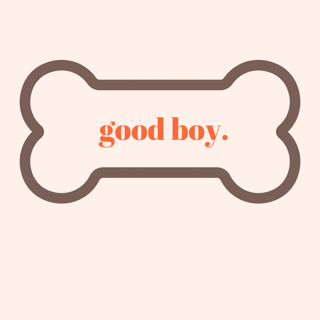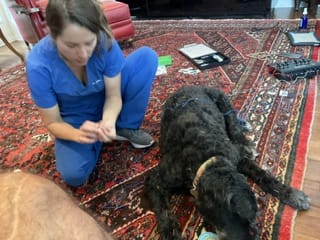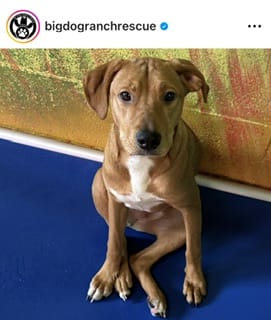
My friend Henry’s dog Hogan died.
Hogan was 17 and I knew he was struggling so I sent Henry this text a few days ago:
”Hi, how’s Hogan?” I wrote.
”Hogan passed away,” Henry responded. “It was his time.”
“I’m so sorry! When? You took such good care of him.“ I replied.
“Yesterday,” wrote Henry.
“Oh gosh. Can I take you out to dinner Sunday?”
“Sure, thanks.”
But let’s back up. Let me tell you about Henry and Hogan.
Henry and I are platonic friends who met playing golf. When we met I was single and he was single but for various reasons, including most importantly Henry’s virulent allergy to my dog, we decided we weren’t a match. As friends who never dated, we figured, it would be easy to be friends forever.
A couple weeks after Henry and I agreed to try to be friends, we were going out to dinner. He had made the reservations and called to tell me how to get there. “It’s tricky to find. It’s a tiny Italian place and the chef cooks straightforward red sauce Italian for five tables of two a few nights a week, and you‘re served whatever he is cooking. By the way, you eat everything, right? When you get off 95, you know how if you go left you see a small unmarked road? You go down that …”
”Ummm, yeah, this is not going to work out,” I laughed. “I mean, I do eat everything! But I get lost going to my own bathroom,” I admitted.
“Okay, right. Come to my house then. It’s easy to find, and I’ll drive.”
As he was letting me through the front door, Henry said “That’s Hogan on the floor. He’s 17 and having some issues getting around, so Tracy comes to do acupuncture treatments on him once a week. ”

Henry got Hogan when Hogan was two months old. He was named after the great golfer (and gentleman) Ben Hogan. Henry was a Portuguese Water Dog, a breed of dog with many great attributes, but chief among them for Henry’s purposes is that they have hair, not fur, and wouldn’t trigger Henry’s allergies. Unlike any other dog, instead of coming up to greet (and sniff) you when you entered his home, Hogan would stay seated and wag his tail sweetly. He just sort of expected you to go to him, but felt sheepish about it because he was raised with proper manners, so he would lower his nozzle while coyly looking up at you, almost flirtatiously. (It was due to his arthritis, I think, his whole coy thing.)
Here’s a better picture of Hogan.

Henry lives by himself. His family lives in Virginia, where Henry grew up (and went to college and business school). Which (to generalize) might explain why Henry is so poised and well-mannered. (I can’t remember ever meeting a guy from Virginia who’s not a gentleman.)
Henry laughs warmly when you say something funny, and also cracks a low-key joke now and then. He listens carefully (he has three older sisters!), nods as he follows along, and responds in a deliberate, thoughtful way to everything you tell him, using the fewest possible words. His manner, even when he talks about Hogan, is stoic and unsentimental.
So when I was at his home the night of the IYKYK Italian dinner and he went upstairs to grab something, I was surprised that Tracy (the acupuncturist) began to bubble over effusively about Henry. “Henry is one of the kindest men I’ve ever met,” she said. “I used to drive an hour each way to a vet practice and I’m a single mom, so that was tough. Henry suggested I start my own business as a visiting acupuncturist, and then helped me with the company formation and filings and showed me how to do my books. I now have a better lifestyle, get to see my son’s games and make more money. Even after all that, he insists on paying in full. Do you have a dog with any aches, by the way?”
We all know men who are deeply emotional but don’t gush (the way I do) about the people they love, their kids, their friends, their partners. Not even their dogs. For instance, my brother - who is as stoic a guy as you’ll ever meet (I think I may have mentioned that he was a Green Beret?) came home one day a few years ago to find that his black lab Ranger had died. My mother happened to be dropping off his daughter just then, and told me that he burst into tears, got down on the floor, laid next to Ranger and sobbed uncontrollably for an hour. I’d already heard this startling description from my mother by the time I talked with my brother, and all he said, in a muttering-under-your-breath-voice was “Yeah, he was 15. It was expected.” And I’m close to my brother.
In other words, you can’t be fooled by a man’s cool temperament where his dog is concerned.
As I was driving over to meet Henry for dinner I was listening to the psychotherapist Lori Gottlieb, the one with the excellent Dear Therapist column in The Atlantic and the author of Maybe You Should Talk to Someone. She was a guest on the podcast The Unspeakable with Meghan Daum. The episode is titled Is Dating A Lost Cause? so naturally it had caught my attention. It is - hand’s down! - the absolute best thing I’ve listened to on dating and forming relationships in today’s world, and I have listened to (and read) everything I can get my ears or eyes on. The episode got acutely relevant to me when Dr. Gottlieb waded into the narrow subject of dating widows [starting at 1:01:48]. She said:
“I tend to find that people who are widowed tend to be the best partners for people. Because they know how to love and be loved. They’re not talking about their crazy exes … and they have a perspective on life. They understand what are the small things and what are the big things.”
“Alleluia!“ I’m a widow! That means I’m good to date!
But immediately after the good news, she delivered some bad (really bad) news:
“What’s interesting is that I see that people who start dating people who are widowed often feel very threatened by the love the person had for the spouse who died … “
And just like that I thought, “Fuck!“ I’m a widow! Nobody wants to date me?
It wasn’t the first time I’d heard the idea that it’s scary dating widows. My friend Samuel told me a few months ago that he is wary of dating widows. The thing he noticed about husbands who die is that they become deified by everybody, most particularly their surviving spouses. “Let’s say he was a good guy in life,“ Samuel pointed out, “with death he becomes a great man. A great man without faults.”
So Dr. Gottlieb was reiterating something I’d already heard from Samuel. But then Dr. Gottlieb said this:
“But see, it’s not a competition … It’s so interesting because I think that widows are the best partners! And so many people avoid them … It’s not a competition! This is a different relationship. It’s a new relationship. You can love more than one person in your life and you can love them just as much! … [R]elationships with widows tend to be the happiest and the ones that really last …”
That was a rollercoaster in the course of just a few minutes. But, ultimately, there’s still hope for me, I guess.
As I listened to Dr. Gottlieb on my way over to have dinner with Henry it also occurred to me that Henry is now a widow. A dog widow.
Which put me into the proper mindset to be a good friend to Henry under the circumstances. Losing the companionship and unconditional love that Hogan threw off for 14 years, is a pretty big deal for all of us, but Henry lives alone and Hogan had clearly become an organizing principle to Henry’s life. So I decided, driving over, to do the things that I appreciated most from my best friends: give me space to talk to talk about my late husband if I felt like it, and bear witness to my grief. Offer to pitch in with the blocking and tackling of post-death chores.
When I sat down across from Henry at the restaurant, I asked him how he was doing. “Fine,” he said, unconvincingly. After some small talk, I gently asked about Hogan. “Tell me again where you got Hogan,” I said, even though I completely remembered from the first telling. This time, instead of the succinct version, Henry told me at length about how Hogan is the first dog he’s had since he was a kid, about all the research he did for a breed he wouldn’t be allergic to, the research on the breeder, the waiting for the litter, how he went through all the photo‘s of the other puppies that he swiped left on before swiping right on Hogan, the five hour drive each way to meet him, his first night at home, how he came up with the name … I followed that up with more gentle questions about Hogan until Henry seemed like he was winding down on the topic.
But one thing I never asked, and never wondered about, even though Henry had dedicated his whole heart to Hogan while he was alive, is whether Henry could ever love another dog again. I know he can. I believe that he will. I believe that loving Hogan through the arc of his life means that Henry has a fuller, more complete perspective on the whole business of loving dogs. And when he’s ready to love again, he knows it is worth it, despite the work and the loss. So he’ll appreciate it even more. It will be different. It will be with another dog with an entirely different personality with whom Henry will create an entirely different love story. No less significant, but a love that will take up, while he is in Henry’s life, Henry’s whole heart.
I know that love is not finite. That you don’t only get one. That our hearts have infinite room. That our hearts are dynamic, resilient, expansive.
And most of all, they‘re hungry.
On our way out of the restaurant I asked Henry what he was going to do with all of Hogan’s things - the dog beds, the blankets, the kibble, the toys. I offered to help pack them up. “Thanks,” he said, “That’s very kind but I already packed everything up.” He pointed to the back of his SUV. “I’m going to drop them off at the Big Dog Ranch Rescue tomorrow. They just got a large shipment of abandoned dogs in from Arkansas and they need things.”
“That’s great,” and then, gently planting a seed, “I have a close friend who got their wonderful dog Emma from Big Dog Ranch,” I said, even though I have no idea which shelter Emma came from.
After I got home from dinner with Henry, I got back on the dating app on Henry’s behalf. Meaning, I started swiping through Big Dog Ranch’s list of dogs available for adoption. At some point I’m going to tell Henry about Hemingway. Hemingway is a Labrador Retriever mix who is “a true social butterfly” who “throws off a lot of love,” according to the site. Which sounds perfect for Henry, who frankly could use a social butterfly, and who has lots of room in his heart to love again.


The Crush Letter
The Crush Letter is a weekly newsletter from Dish Stanley curating articles & intelligence on everything love & connection - friendship, romance, self-love, sex. If you’d like to take a look at some of our best stories go to Read Us. Want the Dish?

